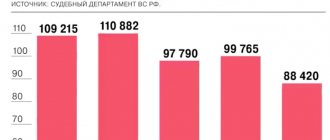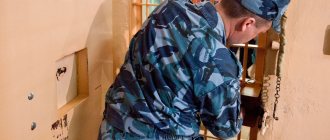I hope that the following tips will never be useful to you. Although, as popular wisdom says: “Don’t swear off scrip and prison.”
(Total 6 photos)
Expert: Vitaly Lozovsky, specialist in the field of criminal subculture. Served 3 years on economic charges
DON'T BE SCARED “Your first task after the metal cell door slams behind you is not to faint,” smiles Vitaly Lozovsky. “You will remember the picture unfolding before you for the rest of your life.” There may be several times more people held here than there should be according to the layout of the pre-trial detention center. The stench emitted by sweaty bodies and the prison toilet - a bucket - located in the corner, mixes with tobacco smoke, which, out of habit, eats the eyes. But don’t panic—people survive here too.”
BE POLITE When entering the “hut”—that’s what a cell is called in prison jargon (hairdryer)—you must first say hello and introduce yourself. In prison (or, as prisoners say, “in prison”) it is not customary to shake hands - experienced prisoners will take this with hostility, and you will be very lucky if the prisoners simply look at you with bewilderment. “It will be enough to just say “Hello, my name is so-and-so,” advises Lozovsky.
FIND THE MAIN Find out who is watching in the cell and immediately go to him. The warden is responsible for order, elimination of conflict situations and compliance with numerous prison rules. He will show you the place where you will sleep (your “hut”), and also explain (or instruct someone to do this) the rules of conduct in the “hut”. It is better to observe them strictly, even if some may seem ridiculous to you. The supervisor will tell you exactly what duties you will perform to maintain your chamber life and who here belongs to the caste of the “omitted” - you cannot communicate with them. You also cannot touch their things and dishes - usually a hole is specially punched in the bowl of the “lowered” one with a nail, to distinguish it from the rest. Therefore, be especially careful.
DON'T TALK Try to ask as few questions as possible to others and even less to talk about yourself. “It is very likely that there is an informer (“hen”, “hen”) who will convey everything he heard from you to the investigator,” explains Vitaly. - If someone starts asking you about the details of your case, ask in response: “For what purpose are you interested?” After this, all questions should disappear by themselves.” Your attempt to get your neighbor to open up - just for the sake of communicating - may arouse suspicions among prisoners that the “chicken” is you. And the reprisal against such characters is as cruel as possible.”
DON'T PLAY Beware of card games, even if they offer to play “just for fun.” If you lose - and it is inevitable if you are not a professional gambler - the winner can claim that by “just because” he meant, for example, $1000. And failure to pay a gambling debt in prison is clearly punishable, if not by death, then by being put in jail. If for some reason you can’t get out, you must say: “I’m playing without interest!” So you stipulate the conditions: no matter how the game ends, you disperse peacefully.
DON'T STINK Practice good hygiene and keep your clothes clean. If you neglect yourself, you risk falling into the category of “devils”, sleeping under a bunk and doing the hardest and dirtiest work. Before going to the toilet in a big way (“to the long distance”), make sure that none of the cellmates is eating or drinking tea. Climbing onto a bucket at this time is considered a grave insult to the entire “hut”. After performing any toilet needs, wash your hands, even if there is a line in front of the sink. With “dirty” hands, after touching the penis, you will “finish”, that is, taboo for use, everything you touch, including your cellmates.
FILTER THE MARKET Watch what you say. “This is highly valued in ordinary life, but in a cell it is simply necessary,” explains Lozovsky. Any word spoken can be masterfully turned against you. For example: “Lemons have much more vitamin C than apples, and I’ll prove it to you now!” “The prosecutors are proving it. What, are you also one of their kind?” And all I had to do was replace “I will prove” with “I will prove it.” “There is a categorical taboo on the word “offend” and all its derivatives,” says Vitaly. “Don’t even think about asking sympathetically a prisoner who is upset about something: “Did someone offend you?” Thus, you directly hint at his belonging to the caste of the “lowered”. You can pay dearly for such hints.”
SHARE Having received a transfer from outside, you must “pay attention to the lads,” that is, allocate part of the parcel “to the common fund.” Who keeps the common fund - ask the person in charge. If you don’t do this, no one will take anything away from you - this is strictly prohibited by prison concepts as “lawlessness” - but you are unlikely to enjoy respect and sympathy among prisoners in the future. And never take anything without asking. Even a seemingly ownerless cigarette taken from the table can be equated to “ratting”—the theft of the property of fellow inmates.”
HOLD ON “Try to forget about free life as soon as possible and prepare yourself for the worst,” advises Vitaly Lozovsky. “The cold certainty that you have to spend several years behind bars is much more beneficial for your psyche than the daily expectation of a miracle and liberation. Take your imprisonment as another life test that you, like a real man, must pass with honor. And remember that in prison physical strength plays practically no role. But strength of character and spiritual qualities are decisive.” Different pre-trial detention centers may have their own nuances, maybe somewhere the rules are not so regulated, but the main rules included in the subheadings of each section of this article apply everywhere.
PRISON SUITS Despite the fact that a pronounced division into suits occurs in the zone, it is necessary to know their differences at the initial stage.
“Thieves”, “bosota”, “brothers” are professional criminals for whom prison is a natural stage in their life path. They constitute the prison elite.
“Men” are people who committed a crime unintentionally, on domestic grounds, in a state of passion or intoxication.
“Devils” or “pigs” are prisoners who have degenerated and do not take care of themselves, who have completely lost their willpower and have resigned themselves to their fate. They do the dirtiest work, but are not subjected to sexual violence.
“Offended”, “lowered” - prisoners whom the rest of the prisoners are persuading to commit sodomy. You can fall into this caste by accident or as a result of “lawlessness” - prison lawlessness. “In any case, there is no way back,” comments Vitaly Lozovsky. “The prisoners can only express sympathy and “put down” or kill the one who illegally deprived you of honor, but you will remain in an unenviable position.” Be careful.
WHAT TO TAKE WITH YOU TO YOUR CELL Let's say you have an hour to get ready before your arrest. Be sure to take with you:
1. A large sports bag You will put it in it and you will store your things in it in the future - there are no bedside tables or wardrobes in the cell.
2. Cigarettes and cigarettes Even if you don’t smoke, they will help you establish relationships with prisoners or pay for any services that smoking cellmates can provide you.
3. Tea The more the merrier. “Tea in prison is both an object of worship and a currency, just like cigarettes,” explains Vitaly Lozovsky. Keep in mind that frequent use of chifir quickly becomes addictive.
4. Clothes Sweatpants, plain and woolen socks, flip-flops, a couple of T-shirts, a hoodie or a warm knit vest - but not a single item should be red; in prison it is considered a symbol of cooperation with the guards. It’s better to leave your favorite woolen sweater at home - here they will immediately unravel it into threads to weave the so-called. “road” - a system of external communication between cameras. Notes (“babies”), cigarettes, or “clouds” of tea travel along the threads.
5. Two bars of soap: Regular (preferably baby soap) for washing and laundry soap for washing.
6. Shaving accessories Everything except cologne (it contains alcohol), toothbrush and toothpaste.
7. Handkerchiefs, a sheet, a couple of pillowcases and, if it fits, take a blanket - bed linen is tight in prisons.
8. Spoon A piercing fork will not be missed, and also take a metal bowl and mug, a boiler.
9. Needle and thread, nail clippers Manicure scissors will not be missed for obvious reasons. Also grab a couple of notebooks, envelopes, several fountain pens with spare refills.
10. Products Onions and garlic, lard, bouillon cubes, instant noodles, sugar, salt, crackers. Do not take canned food - they will be confiscated, since the sharp edges of an open can can be used as a bladed weapon
This stone or wooden building is often one-story, but even if it is five-story, it is still called a barracks. The design of the bunks is the same as in the prison: frame 1.8 x 0.5 m, legs 0.5 m. The second tier is at a height 1–1
.5 m, there is also a third... But instead of longitudinal and transverse steel strips - cups - just an ordinary mesh - some have a simple, “soldier’s” one; who has the “wetter” – armored…
In the evening, when everyone is in place, there is an endless hum of voices merging together in the barracks. Some are gambling, in another corner they are chasing chifir; someone cooperates - he cuts a cute little box with a homemade cutter, which he then exchanges for tea; about ten people immediately laugh at the joke; others are fast asleep amid this seemingly unbearable hubbub. Tobacco smoke is thick. But everyone got used to everything. Thank God it's warm. Cigarette butts and pieces of paper are thrown into the aisle between the rows of pins - the pin will be removed. However, in conditions of tobacco shortage, tobacco is shaken out of cigarette butts into a special jar from some kind of monpensier. Sometimes the following order is established: during the day, garbage is thrown into trash cans, and at night, after lights out, into the aisle. But these are subtleties...
Some kitten in a barracks is private and inviolable property. Kolya Sh., returning to the barracks after his shift, discovered that the kitten Prapor, who lived near the bunk, had a knocked out eye and a broken leg. Half an hour later, the offender was found, and Kolya drove a sharp point made from a screwdriver under his rib. “The handle is already broken!” Things worked out well: the cat-hater got off in the medical unit, Kolya didn’t turn himself in, he admitted his guilt, and the kitten got better - although he then limped until his death.
The corner of the barracks is a criminal place. The “overseer,” the authority, usually sleeps (lives) there. Nearby are his associates. And all the lower places have their own degree of thieves - except perhaps the bunks at the very entrance, on which the “roosters” settle (this is under strict regime). By the way, the lower place, of course, has advantages: you can lie down on the bunk to take a nap, you can play cards or backgammon on it, you can talk with the kent while drinking “merchant” (simply strongly brewed) tea. However, there are also disadvantages: people always come to visit an overly sociable kent, sit on the bunk, wake him up to talk or chifir - it’s hard to refuse and even more so rude. Let us not forget that “sending to...” in the zone and in prison is a grave insult, sometimes punishable by death. The top bunk seems to be more “yours”: well, who will climb up to drink tea?
Nowadays, in some zones, the lower places are for sale: if you have nothing to pay for, sleep the entire time upstairs, where the caretaker put you. Of course, the respected Kent-countryman will be received humanely, and he will not be left without a place; what to do without support?
In the general regime (southern zone), they came up with a move: the new arrival was placed on the “thug” lower bunk in the immediate vicinity of the corner where the “traveler” lived. And depending on the newcomer’s behavior, they left him or gradually moved him towards the exit, along the top...
Caucasians especially love corner or lower places: “blat” is their passion, their second life.
The washbasin and “dalnyak” (toilet) are sometimes on the street, but more often in the barracks itself, a separate room. Here, in the washroom, tea is usually brewed using a “machine” - a heater made of two metal plates (transformer, or, if available, razor blades). When half of the barracks begin to brew chifir, including a dozen of the most powerful “machines,” the illumination in the barracks decreases, and sometimes the plugs are knocked out and the switchboards are on fire.
At night, controllers walk around the detachment barracks - in a group of three or four people, shining a flashlight in the face, waking up those who have a red “runner” stripe on their card (prone to escaping). Along the way, they wake everyone up, interrupting the short sleep of the working people...
What is a shkonka? This question is asked by many law-abiding citizens who have heard such a term from the conversations of other people at least once in their lives. So, a “shkonka” is just a sleeping place, or a bed, in places of deprivation of liberty. Former convicts quite often associate their most vivid memories with this term. After all, a bunk and bedside table for a prisoner is like part of an apartment or house in a colony, a place where during curfew hours you can read, write a letter to family and friends and just relax. This concept will be discussed in more detail in this article.
Where and how is the word “shkonka” used?
In addition to the meaning of the word “” in dictionaries, we also recommend that you familiarize yourself with examples of sentences and quotes from classical literature in which the word “” is used.
Read also: Dzavar cereal beneficial properties
This will make it much easier for you to understand and remember how to use the word “ shkonka”
"in text and oral speech.
Examples of the use of the word "shkonka"
The boatswain - a lying dark-skinned corpse with the disposition of an old prostate - allowed us to occupy a free space in the cockpit.
Igor Minakov, Ship of gourmets vs concrete battleship
A little comparison
Despite the fact that in some sources the bunk is called a bunk, these two concepts are slightly different from each other. In addition, as many citizens who served an administrative, daily sentence in a temporary detention center know, there are no metal bunk beds there. In the temporary detention center there are only “bunks” - a sleeping place made of boards (most often without a mattress). It is usually attached to the wall and rises slightly above the floor.
What is a bunk in this case? This is also a sleeping place, only a bed, usually metal and in two tiers (places) for prisoners who are in a pre-trial detention center or in a zone. The bunk is intended for proper sleep and rest; it is always covered with a mattress.
Table for eating
The table (“oak tree”) is the real center of the prison cell. They dine with him, write appeals, play checkers, chess and backgammon, communicate, sort things out. As a rule, there are not enough places at the table for all the inhabitants of the cell, and a certain hierarchy is introduced.
Like everything else in the cell, the table is made of metal. The benches are also metal, with wooden seats (if not broken off). All this is firmly fixed to the floor and welded together.
The cells usually have some kind of shelves for storing dishes, and sometimes there are also bedside tables. All this is also metallic and devoid of any charm.
Army life
In military units you can see massive double beds made of metal, just like in prisons. And even in naval service, sailors have to dream of comfort when they see a sleeping place. From the point of view of linguists, these are the real shkonki! But due to the close connection with criminal jargon, sanctions are possible from senior comrades responsible for discipline if an ambiguous term is used.
Where do the bees sit?
“Bees” are former police officers, judges, prosecutors, FSIN employees, judges and military personnel. They are kept in special prisons, of which there are about a dozen in the country. There are the fewest judges in such zones, who rarely end up in prison. Moreover, even those who have worked as an ordinary police officer for at least a month end up in prisons for employees of state institutions. In the zones where the "Bees" sit, thieves' orders do not apply. Generals and lieutenants are on equal terms. Each “Bees” believes that they entered the zone by mistake.
Former law enforcement officers will never be sent to prison with ordinary prisoners. After all, they can be “sewn on” on the very first day of their stay.
What is a shkonka?
Words from prison jargon can often be heard not only on radio and television, but also from other people who once had to serve a sentence for crimes committed in places not so remote.
Thus, many criminal concepts have become firmly established in everyday life. One of these words is “shkonka”. It happened a long time ago and in the current 2021 does not lose its relevance.
Shkonka is the name given to any sleeping place or bunk in the zone (it doesn’t matter - with or without a mattress). They are bunk beds, which are welded from metal parts, and with a mesh instead of inconvenient rods. By the way, they are very comfortable.
Many people think that bunk is synonymous with the word “bunk”, but these are different concepts. Bunks are simply boards placed on supports; a mattress is placed on them. Usually the bunk is attached to the wall so that it rises slightly above the floor.
Having served his sentence, every prisoner knows what a bunk is and what it is needed for . Moreover, even after serving their sentence, they continue to call the bed or sofa that way.
After all, former prisoners have warm memories associated with the bunk. This is a small but own corner where you can spend time and sleep.
Next to the bunk there is a bedside table and a chair where you can store writing utensils, a plate, a spoon and a mug . Many prisoners who do not want to work spend almost the whole day on their bunk.
A small characteristic
So, what shkonka means has become clear. This term refers to a sleeping place in places isolated from society. Usually in pre-trial detention centers and colonies.
As a rule, what many convicts remember most is life in the zone. After all, it is there that the convict has his own small corner - a bunk where he sleeps, a chair and a bedside table where he keeps a mug, a spoon and writing utensils. Many prisoners who did not want to work spent almost the whole day in their bunk.
Therefore, when answering the question of what a bunk in a prison camp is, we can safely say that it is a convict’s bed, a place where he can gather his thoughts and rest.
Mysteries of origin
It is impossible to trace the etymology, although some sources suggest roots in Hebrew or Yiddish. Simply based on the history of the appearance of many other “thieves” expressions. But almost everyone can answer that a bed in a correctional facility or a security facility is a bunk. What could it be like? Depends on the specific establishment:
- bench mounted on the wall;
- collapsible metal bed;
- multi-tiered bunks, etc.
In any case, the speaker means a sleeping place. And its size, shape and quantity do not matter.
“Tucking up my bunk for the Russian anthem”: everyday life in a pre-trial detention center for a convicted transgender person
For Michelle's relatives, her forced coming out turned out to be a serious test: the wife found out about her husband's transgender status after the initiation of a criminal case, and the neighbors stopped greeting their elderly parents.
A close friend of the convicted woman, Lada Preobrazhenskaya, gave MK excerpts of letters that Michelle sent to her from the pre-trial detention center. With the permission of the recipient, we publish them and tell how the woman endures imprisonment.
***
The “Case of Three Pictures” became public at the end of November - it was then that the trial took place, as a result of which Michelle was sentenced to three years in prison and a fine of 100,000 rubles. The convict is an epidemiologist who worked for 30 years in the epidemiological service of the Bryansk region. Professionally, she is characterized only positively and has a large number of certificates and awards.
“The man protected us from diphtheria and measles, typhoid and tuberculosis for thirty years; dealt with the problems of nosocomial infections and vaccine prevention,” says Michelle’s friend Lada Preobrazhenskaya. — Participated in many World Health Organization activities to eliminate measles and polio. He studied the immunity of those living in the territory affected by the Chernobyl disaster.
Michelle describes herself as a transgender woman. Two years ago she started hormonal therapy, but she had not yet had time to receive a conclusion about gender reassignment from the medical board and change her documents to female ones. All this was planned for the future. Those around her, including her family, did not know about her transgender status. The harsh sentence caught Michelle by surprise and forced her to make a serious choice.
The hearing was closed, and only a few weeks after the verdict it became clear from a letter to a friend that during her last word Michelle openly admitted that she was a woman.
Here's what she writes about it:
“In my last word at the trial, I began to call myself a woman, talk about my plans for gender reassignment, undergoing relevant examinations and obtaining documents. I didn’t think that this could significantly affect the sentence; I was already falling into the abyss, to the very bottom of this world. And I couldn't lie.
Then they put my first handcuffs on me. I only managed to say a few words to my wife on the phone: “Three years in prison. Goodbye!"
I was locked in a cage in the courtroom. They ordered me to strip naked and sit down like that a couple of times.”
Then Michelle was taken to the pre-trial detention center, where she also had to undress for inspection. “I could no longer help but say who I am. I’m wearing lingerie and breasts of a specific size,” she wrote to a friend.
There, in the pre-trial detention center, the following dialogue took place between the convict and the employee:
— Do you feel like a woman?
- Yes.
- It was? Or do you continue to feel this way?
- Yes. This is unchanged.
- Okay, we'll think about where to put you here. But don’t tell everyone about this here. They may not understand.
Michelle was taking a huge risk by making such a statement. She did not have a single medical report confirming her transgender status. However, the detention center staff understood her situation and were able to provide her with comfortable conditions of detention.
“I didn’t know what awaited me after these confessions. Just punching, humiliation or violence. I only had my hormones in my bag, my breasts and my words. People might think that I was just being a fool, hoping to get more comfortable conditions.
I was taken to a small cell, only two boards along the walls, to await my fate. I don't know how much time has passed. I walked from wall to wall, sat on these boards, walked again, it was impossible to lie down on them. I constantly heard the ringing of my phone like a phantom pain. I will never hear the usual calls from my wife or work. And there is no more work. The profession that I studied and devoted 30 years of my life to no longer exists...”
Michelle was placed in solitary confinement. According to Lada Preobrazhenskaya, she does not complain about the conditions and notes that the jailers treat her with respect. A woman keeps a diary where she writes down her thoughts and experiences.
Excerpt from another letter:
“I became happy today. I wrote a statement with a request to stay here at work if the verdict is left unchanged. Why send me somewhere? I would make an excellent nurse or cleaner with a diploma as a sanitary epidemiologist. Understanding, responsible, for a prison - not even a find, but a treasure. In general, I can do a lot of things, no worse than many handy “craftsmen.” Hammer, trowel, drill, saw. Everything is familiar. In Russia, while you study to become a doctor, you learn everything. Now I'm thinking about letters. Receiving letters from people you always think about is happiness. And in the dungeons this is a special happiness.
I am a convict, I am a prisoner, I am sentenced to imprisonment for years. As long as I have a pen and notebook, I can read and write. The most important thing is that I can still think, which means I can talk about my thoughts and feelings. Maybe this doesn’t matter to anyone, not even me...
Why am I sitting behind bars? Because I pleaded guilty after the fact that the charges were brought. To be honest and obedient according to the laws of our time is already a sentence.”
In the letters, Michelle also spoke about the daily routine in the pre-trial detention center.
“Every day, the routine is to walk for one hour. An exercise yard is a room where there is a lattice instead of a ceiling. Large chamber with atmospheric air. I walk there alone, do physical exercise. While I was walking, I was writing a letter.
I'll probably go crazy after three years of imprisonment. Although in the colony they will probably knock my brains out, and I will become just a fool. That’s why I write a lot and often while I can.
Every day at 6 am we wake up, turn on the “daylight” lights, roar - the Anthem of Russia. And then the song “Where the Motherland Begins” sounds. I tuck the bunk and listen to a good song about where it starts.
A month passed behind bars. I no longer hear my favorite music, I don’t watch movies, I read what they give me. I remember crying from helplessness and the inability to change anything, from the unknown. Someone deleted my page on the Internet, it’s probably for the best. At home, I said a long time ago that I would try to die in such a way that there would be nothing to bury...”
Michelle is now being defended by new lawyers, and the verdict is being appealed . The date for the review of the case is already known - the meeting will take place in the second half of January. A close friend was able to transfer the necessary hormonal drugs to prison, but the question of a person’s survival during the process of transgender transition in a colony remains open. In addition to hormone therapy, Michelle has a disability and is in remission from cancer.










